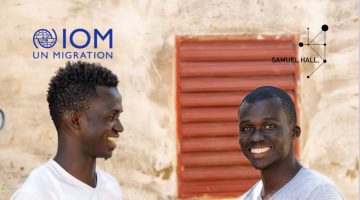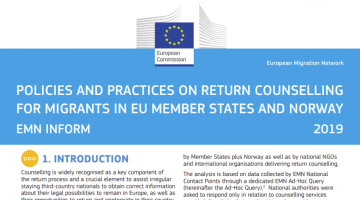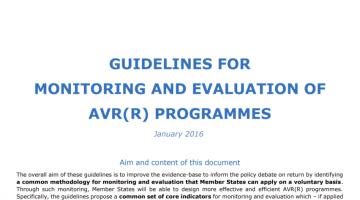Library
- Resource - Guidelines/Toolkits/Manuals
This guide is based on the long-standing experience of the ISS network in cross-border child protection case management, and aims at contributing to a better implementation of international standards for children on the move worldwide, from initial contact with the child to the search for a...
SourceInternational Social Service (ISS)
- Projects -
The objective of the EU Readmission Capacity Building Facility (EURCAP) – launched in April 2016 – is to contribute to effective and efficient cooperation in migration governance between the EU and its partner countries through capacity-building initiatives. The EURCAP Facility aims at strengthening...
SourceInternational Organization for Migration (IOM)
- Projects -
FORAS, meaning “opportunities” in Arabic, is a project that aims at strengthening the sustainable reintegration of migrants returning from Morocco to eight target countries of origin (Burkina Faso, Cameroon, Côte d’Ivoire, Democratic Republic of Congo, Guinea, Mali, Senegal and Togo) through...
SourceInternational Organization for Migration (IOM)
- Projects -
The ‘Returning to New Opportunities’ programme creates prospects – for returnees, internally displaced people and the local population. In the partner countries, the programme offers a wide variety of individual support services. Advice Centres for Jobs, Migration and Reintegration and approximately...
SourceGovernment of Germany Deutsche Gesellschaft für Internationale Zusammenarbeit (GIZ) GmbH
- Projects -
The EU-IOM Joint Initiative was launched in December 2016 with funding from the EU Emergency Trust Fund for Africa. It enables migrants who decide to return to their countries of origin to do so in a safe and dignified way, in full respect of international human rights standards and in particular...
SourceInternational Organization for Migration (IOM)
- Video -
Rewda migrated to Malta in search of better opportunities. Due to difficult financial conditions there, and in lack of legal status, she decided to return home. With the support of her relatives, she has set a small business that allows to provide for the family.
SourceInternational Organization for Migration (IOM)
- Video -
Augustine tells us about his difficult journey through the Sahara desert, and the reasons why he decided to return to Nigeria. Now back in Abuja, he has set an online radio (http://www.amebofm.com) which aims to empower and sensitize the youth of his country on the danger of irregular migration.
SourceInternational Organization for Migration (IOM)
- Video -
Back from Spain, Amedy is now working hard to achieve his dream: launching his own seaport services company in Senegal.
SourceInternational Organization for Migration (IOM)
- Video -
Peshang tells us about his decision to return from Greece, and how he is trying to overcome reintegration challenges in his country of origin.
SourceInternational Organization for Migration (IOM)
- Video -
The UN Migration Agency (IOM) in Cyprus operates the Assisted Voluntary Return and Reintegration (AVRR) for third-country nationals who wish to return to their country of origin. Learn more about AVRR: https://goo.gl/7ZEvSF
SourceInternational Organization for Migration (IOM)
- Resource - Analysis
This study – a collaboration between the International Organization for Migration, Samuel Hall and the University of Sussex – builds on previous research on the reintegration of returning migrants to analyse outcomes of reintegration in three fieldwork countries (Guinea, Morocco and Senegal), and an...
SourceInternational Organization for Migration (IOM), Samuel Hall, University of Sussex
- Resource - Guidelines/Toolkits/Manuals
This first introductory Knowledge Bite focuses on a high-level analysis of the Reintegration Sustainability Survey (RSS) data collected in the framework of the various EU-IOM Actions and centrally available with the scope of defining some of the factors affecting sustainable reintegration outcomes...
SourceInternational Organization for Migration (IOM)
- Resource - Guidelines/Toolkits/Manuals
This EMN Inform seeks to identify the different policies and approaches for return counselling used by Member States plus Norway as well as by national NGOs and international organisations delivering return counselling.
SourceEuropean Migration Network (EMN)
- Resource - Report
This report was prepared as the background document for the ASEAN Workshop on Reintegration Programmes for Returning Migrant Workers (27–28 August 2019) in Yogyakarta, organized by the Ministry of Manpower, Government of Indonesia, and the ILO TRIANGLE in ASEAN programme.
SourceInternational Labour Organization (ILO)
- Resource - Guidelines/Toolkits/Manuals
The overall aim of these guidelines is to improve the evidence-base to inform the policy debate on return by identifying a common methodology for monitoring and evaluation that Member States can apply on a voluntary basis. Through such monitoring, Member States will be able to design more effective...
SourceEuropean Migration Network (EMN)
- Resource - Analysis
This report presents the findings of a study that explored the factors influencing the decision to return, including the role played by return policy interventions. The study also aimed to enhance understanding of the concept of sustainable return, how to measure it, and how to promote it.
SourceInternational Organization for Migration (IOM)
- Resource - Policy Brief
With very limited monitoring and evaluation of AVRRs we know little about how well they work and whether the promised support is given. This policy brief outlines some of the compelling reasons to monitor and evaluate AVRRs.
SourcePeace Research Institute Oslo (PRIO)
- Resource - Other
This blog post proposes six indicators, which can help assess the human rights compliant implementation of commitments under Objective 21 and streamline states’ reporting to the International Migration Review Forum, intended to discuss implementation of the GCM.
SourceRefugee Law Initiative
- Resource - Policy Brief
This policy brief addresses people’s post-return vulnerabilities and protection needs beyond refoulement and demonstrates that returns can both exacerbate existing, as well as create new vulnerabilities. It argues that rights-based return policies need more robust vulnerability assessments and more...
SourceUnited Nations University (UNU) United Nations University Institute on Comparative Regional Integration Studies
- Resource - Guidelines/Toolkits/Manuals
Return migration takes place along a spectrum from voluntary to involuntary movement, with at least six identifiable points: Solicited, Voluntary, Reluctant, Pressured, Obliged, Forced.
SourceInternational Organization for Migration (IOM)
Pagination
About the Migration Network Hub
What is the Migration Network Hub?
The Hub is a virtual “meeting space” where governments, stakeholders and experts can access and share migration-related information and services. It provides curated content, analysis and information on a variety of topics.
The Hub aims to support UN Member States in the implementation, follow-up and review of the Global Compact for Migration by serving as a repository of existing evidence, practices and initiatives, and facilitating access to knowledge sharing via online discussions, an expert database and demand-driven, tailor-made solutions (launching in 2021).
Submit your content
What content is displayed in the Hub?
The Hub aims to help you find information on migration, ranging from policy briefs and journal articles, existing portals and platforms and what they offer, to infographics and videos. The different types of resources submitted by users undergo peer review by a panel of experts from within the UN and beyond, before being approved for inclusion in the Hub. To provide guidance to users based on findings of the needs assessment, the content is ordered so that more comprehensive and global resources are shown before more specific and regional ones. Know a great resource? Please submit using the links above and your suggestion will be reviewed. Please see the draft criteria for existing practices here.
Apply to join the Peer Review Roster
Content submitted to the Migration Network Hub is first peer reviewed by experts in the field from both the UN and beyond. Applications are welcomed to join the roster on an ongoing basis. Learn more here.
Contact us
We welcome your feedback and suggestions, please contact us
*References to Kosovo shall be understood to be in the context of United Nations Security Council resolution 1244 (1999).
Newsletter
Subscribe to our newsletter.